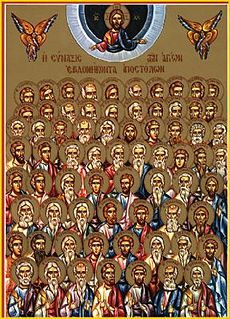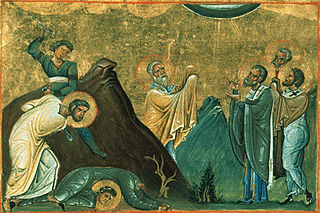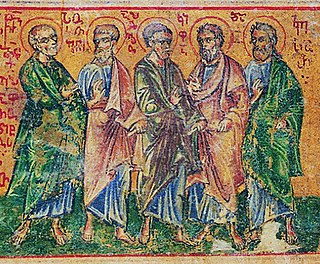Related Research Articles

Timothy or Timothy of Ephesus was an early Christian evangelist and the first Christian bishop of Ephesus, who tradition relates died around the year AD 97.

March 29 - Eastern Orthodox liturgical calendar - March 31

The seventy disciples or seventy-two disciples, known in the Eastern Christian traditions as the seventy apostles or seventy-twoapostles, were early emissaries of Jesus mentioned in the Gospel of Luke. The correct Greek terminology is evdomikonta (εβδομήκοντα) apostoli or evdomikonta mathetes.

Quartus was an early Christian who is mentioned in the Bible.

January 3 - Eastern Orthodox liturgical calendar - January 5

January 21 - Eastern Orthodox liturgical calendar - January 23
Onesiphorus was a Christian referred to in the New Testament letter of Second Timothy. According to the letter sent by St. Paul, Onesiphorus sought out Paul who was imprisoned at the time in Rome.

Ampliatus, was a Roman Christian mentioned by Paul in one of his letters, where he says, "Greet Ampliatus, whom I love in the Lord." He is considered one of the Seventy Disciples by the Eastern Orthodox Church. Tradition has it that he and his companions subsequently attached themselves to the Apostle Saint Andrew, and ultimately died martyrs.

Erastus of Corinth, also known as Erastus of Paneas, held the political office of steward, in Corinth, according to the Epistle to the Romans 16:23 of the New Testament. The office is defined as "the manager of household or of household affairs" or, in this context, "treasurer". The King James Version uses the translation "chamberlain", while the New International Version uses "director of public works". A person named Erastus mentioned in 2 Timothy 4:20 and Acts 19:22 is often taken to be the same person. However, whereas the Erastus mentioned in the second letter to Timothy may be the same person, it is unlikely that the Erastus referred to in the Book of Acts is the same Erastus. This Erastus was a travelling companion of the apostle Paul and accompanied him on his third missionary journey. It was on this third expedition that Paul penned the letter to the Roman believers in which he sent greetings from Erastus, the city treasurer. He could not have been the person in Paul's entourage. The apostle Paul wrote his letter to the church in Rome while he was in Corinth.

Urban of Macedonia is numbered among the Seventy Apostles. Along with the Apostles Ampliatus, Stachys, Narcissus of Athens, Apelles of Heraklion and Aristobulus of Britannia he assisted Saint Andrew. St. Andrew ordained Urban bishop in Macedonia. He died a martyr, and his feast day is October 31.

Herodion of Patras was a relative of Saint Paul whom Paul greets in Romans 16:11. According to tradition, he was numbered among the Seventy Disciples and became bishop of Patras, where he suffered greatly. After beating, stoning, and stabbing him, they left him for dead, but St. Herodion arose and continued to serve the Apostles.

Rufus of Thebes is numbered among the Seventy Disciples in Eastern Orthodox tradition. He was bishop of Thebes in Greece, and according to some traditions is referenced in Romans 16:13. His feast day is April 8. However according to Easton's Bible Dictionary the Rufus in Romans 16 could well have been the Rufus mentioned in Mark.

Asyncritus of Hyrcania, also Asynkritos, was numbered among the Seventy Disciples. He was bishop of Hyrcania in Asia. Saint Paul mentions him in his letter to the Romans. The Church remembers St. Asyncritus on April 8.
Phlegon of Marathon is numbered among the Seventy Disciples. He was bishop of Marathon in Thrace. He is referenced in Romans 16:14, and his feast day is on April 8.
Hermes of Dalmatia is numbered among the Seventy Disciples. He was bishop in Dalmatia. He is usually identified with the Hermes mentioned by Paul in Romans 16:14. His feast days are celebrated on April 8 with his fellow martyrs, and on January 4 among the Seventy.

Philologus of Sinope is numbered among the Seventy Disciples, and is commemorated with them on January 4. He is also commemorated on November 5 together with Ss. Patrobas, Hermas, Linus, and Gaius.

Sosipater is a person mentioned in the New Testament, in Romans 16:21. He is probably the same person as Sopater mentioned in Acts 20:4.

According to the New Testament book of Romans, Tertius of Iconium acted as an amanuensis for Paul the Apostle, writing down his Epistle to the Romans. He is numbered among the Seventy Disciples in a list pseudonymously attributed to Hippolytus of Rome, which is found in the margin of several ancient manuscripts.
Fortunatus is person mentioned by St Paul in I Corinthians 16:17: I was glad when Stephanas, Fortunatus, and Achaicus arrived, because they have supplied what was lacking from you.

Cephas of Iconium is numbered among the Seventy Disciples, and was bishop of Iconium or Colophon, Pamphylia. The name "Cephas" is Aramaic for "Peter."
References
- This article is derived in whole or in part from Carpus of Beroea at OrthodoxWiki, which is dually licensed under CC-By-SA and GFDL. All relevant terms must be followed.